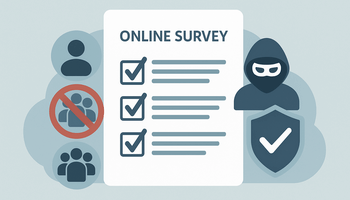
Fraud in Online Surveys*
Understanding, Detecting, and Mitigating Risks
Online surveys have become a cornerstone in gathering insights across diverse domains, from market research to academic studies. Their accessibility, cost-effectiveness, and rapid turnaround have made them widely popular in today's digital age. However, this method of data collection is not immune to vulnerabilities, with fraud being a significant concern undermining their validity and reliability.
What Is Fraud in Online Surveys?
Fraud in online surveys refers to deceptive practices undertaken by respondents that compromise the integrity of survey results. It can manifest in various forms, including false or misleading responses, multiple submissions by the same individual, and exploitation of incentive systems intended for genuine participants.
Types of Fraud
Fraud in online surveys can be categorized into several key types:
- Duplicate Entries: Individuals participate multiple times in the same survey to claim additional rewards or incentives.
- False Demographic Information: Respondents provide inaccurate information about their age, gender, location, or other demographic factors to qualify for surveys they otherwise wouldn't be eligible for.
- Survey Bots: Automated programs designed to complete surveys en masse, often distorting data significantly.
- Random Responses: Participants deliberately fill out surveys quickly and haphazardly without providing meaningful or truthful answers.
- Incentive Manipulation: Fraudsters exploit reward systems by creating fake accounts or using dishonest tactics to maximize their gains.
Consequences of Fraud
- Compromised Data Integrity: Fraudulent responses dilute the quality of data, making it less representative and actionable.
- Misleading Insights: Decisions based on inaccurate survey results can lead to flawed strategies and wasted resources.
- Financial Loss: Organizations incur costs by rewarding fraudulent participants or investing in surveys with unreliable outcomes.
- Erosion of Credibility: Persistent fraud damages the reputation of survey platforms and diminishes trust among genuine respondents and stakeholders.
Detecting Fraud in Online Surveys
Technical Methods
- IP Address Tracking: Monitoring IPs to detect duplicate entries or patterns indicative of bots.
- Digital Fingerprinting: Using unique identifiers (such as device or browser configurations) to pinpoint fraudulent behavior.
- Captcha Systems: Implementing challenges to verify human participants and deter bots.
Behavioral Analysis
- Response Time Monitoring: Flagging respondents who complete surveys unrealistically quickly.
- Consistency Checks: Identifying contradictory or illogical answers within surveys.
- Open-Ended Response Analysis: Examining qualitative answers for generic or nonsensical replies.
Preventing Fraud
Mitigation strategies are essential to safeguard the integrity of online surveys:
- Mandatory Registration: Requiring participants to create verified accounts before accessing surveys.
- Enhanced Screening Questions: Utilizing dynamic and tailored questions to ensure respondents meet eligibility criteria.
- Incentive Controls: Limiting reward distribution to genuine participants through tiered and secure systems.
- Survey Platform Integration: Collaborating with specialized survey tools that offer robust fraud detection features.
Future Directions
The fight against fraud in online surveys is ongoing, driven by technological advancements and evolving methodologies. Artificial intelligence (AI) and machine learning (ML) are emerging as powerful tools to analyze patterns, predict fraudulent activity, and enhance survey reliability. Furthermore, ethical guidelines and industry standards aim to promote transparency and trust in online research.
Conclusion
Fraud in online surveys poses significant challenges to researchers, businesses, and policymakers relying on accurate data to make informed decisions. As the prevalence of online surveys continues to grow, so too must our commitment to detecting, preventing, and addressing fraudulent practices. Through collaborative efforts and innovative solutions, the integrity of online surveys can be preserved, ensuring their role as a valuable tool in understanding the complexities of the modern world.
* This Blog was created in full by MS Word AI

